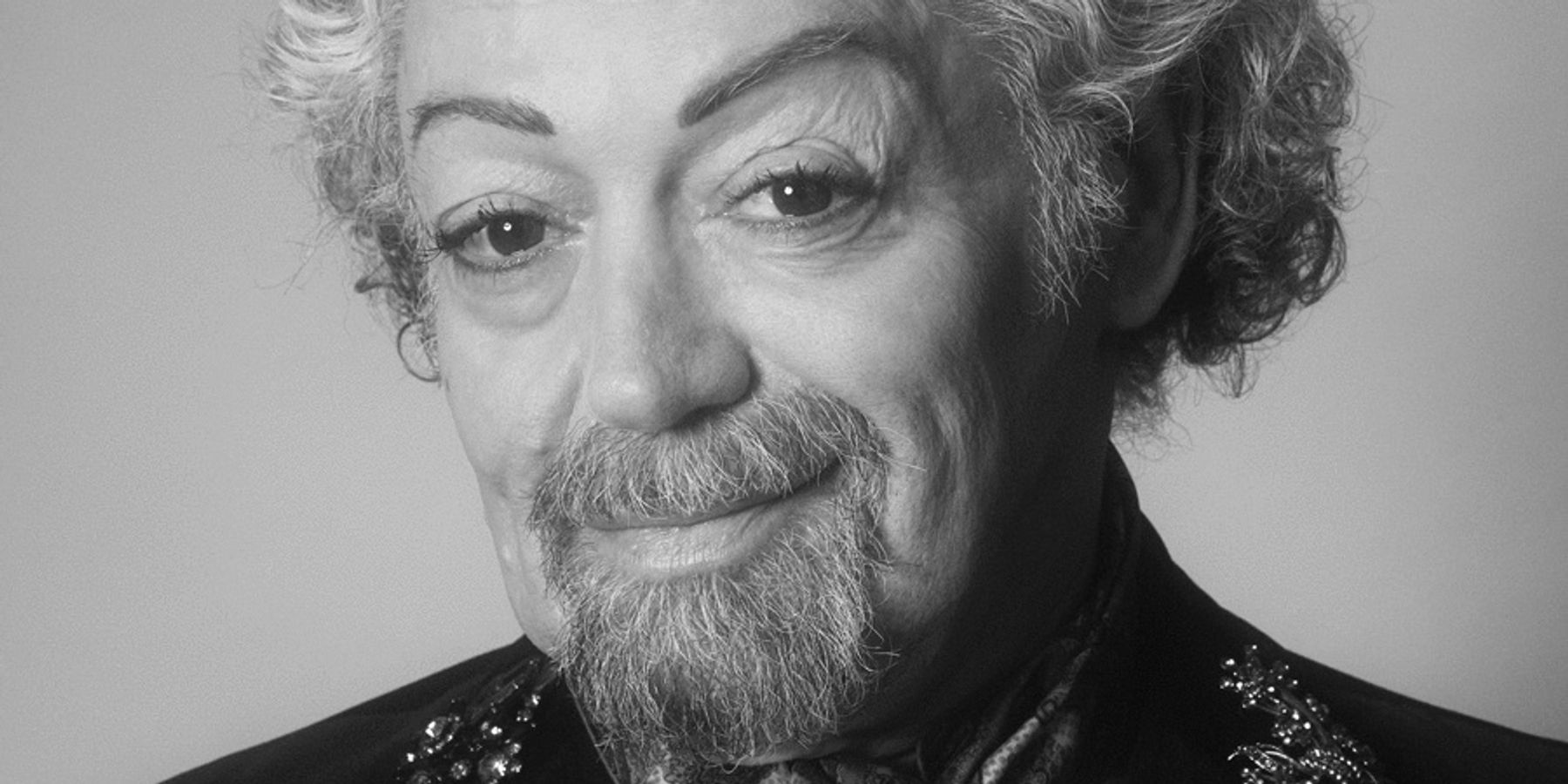
Inside One Person's Journey From Man to Woman and Back Again
By Jacob TobiaApr 03, 2018

It's sometime in the mid-1980s in the East Village, and Natalia "Tish" Gervais is flitting about like a bohemian goddess. Sporting black Ray-Bans, bright yellow parachute pants, a black crop top, asymmetrical earrings and a black leather belt that almost passes for bondage gear, Tish walks about, seemingly carefree. She sings a little tune to herself, swings into a bodega to grab a snack, then turns to a camera trailing her, "So where do we want to go?"
She's gorgeous, tall and shapely, and her playful femininity seems at one with the fabric of the city. Tufts of curly brown hair fluttering in the wind, she greets friends and strangers on the street alike and makes her way toward Tompkins Square Park.
Without context, you might think that Tish is just another beautiful young woman running around the Big Apple. But then you'd miss the fact that in New York City, Tish is a transgender nightlife icon.
 Tish Gervais – ©Brian Belovitch Archive NYC
Tish Gervais – ©Brian Belovitch Archive NYCHints of Tish's prominence in the swirl of downtown Manhattan peek out in this grainy archival video on YouTube, in which the scene above appears. As she continues her stroll, the camera follows Tish into a newsstand, where she flips through the week's magazines. Rifling through the pages of Vanity Fair, she pauses to point out a photo of herself, "There's that one!" before picking up a copy of Details to point out another. "And did you see that one?"
At one point in the '80s, right around the time of this video, Tish was everywhere: performing at the Limelight, gracing the pages of high society magazines, making appearances at all of the coolest downtown parties.
And then, just like that, she wasn't.
In 1972, Brian Belovitch made the difficult decision to transition and live as a trans woman named Tish Gervais. In 1987, Tish Gervais made the equally difficult decision to retransition and live once again as a man named Brian Belovitch
---
Growing up, Brian's story mirrors those of many in the trans community. As a young person, Brian was clearly different, and his natural femininity made him the subject of taunting, discouragement and outright dismissal in a turbulent home. Like many young trans kids, he left his home, moving from Providence, Rhode Island to New York City, but that's about where the similarities stop.
Arriving in New York, he encountered a gay community that felt cleft in two. "When I was coming out in the '70s, you had to pick a lane," explains Brian. "Either you were a butch queen and you looked like Cheyenne Jackson or Matt Bomer or you were in the other lane: You were a drag queen or [got a] sex change. It was very lonely and confusing to be in the middle of all of that. You were really herded into those roles."
Refusing to forsake his femininity and butch it up in order to fit in with masculine gay men, Brian found himself confronted with what he perceived as two equally challenging options. He could either pursue medical transition, learn to live as a trans woman and have some degree of passability while navigating the world, or he could blaze a new trail, live life somewhere in between manhood and womanhood, be visibly gender nonconforming and give up any semblance of safety, employability or livelihood. For a moment, Brian lived somewhere in-between, presenting femme and toying with drag: "Initially, I was running around in hot pants and halter tops and lipstick and no boobs, no falsies, no makeup, with a moustache and hair on my chest. I came out like that in Provincetown when I was 17. Oh, and glittering socks. We used to call it 'Scare Drag!' because it was scarcely drag."
But without gender nonconforming or nonbinary role models to guide him, Brian found himself feeling less and less able to navigate the world living in between. With social pressure mounting, Brian felt he needed to choose a side, to choose between living as a man or living as a woman. And, because the idea of relinquishing his femininity felt impossible, the decision to transition and live as a woman seemed like the only sensible thing to do.
Brian credits his initial decision to transition less with a deep-seated feeling that he was a woman and more with an inability to stand up to social pressure. In a world that inexorably equated femininity with female bodies, Brian felt that the only way to retain his femininity was to make his body female. "I believed what people told me, and in a way [I] was very naive. I didn't feel very strong about my identity in the first place," he says. "I just kind of drifted wherever the wind blew. If I got approval from others, I would do it. Seeking approval from others on such a very deep level led me to many of my decisions to transition in the first place."
For Brian, transitioning felt like the only way to access day-to-day safety. "Transitioning became a way to survive in the world," he says. "When I made that decision to transition, I thought 'I'm gonna go undercover. I'm gonna go stealth. No one's gonna ever know so they can't hurt me. So they can't make fun of me. It'll be harder for them to pick me off or exclude me.'"
 Tish Gervais – ©Brian Belovitch Archive NYC
Tish Gervais – ©Brian Belovitch Archive NYC Tish Gervais – Danceteria NYC 1986 ©Courtesy Jim Mulqueen
Tish Gervais – Danceteria NYC 1986 ©Courtesy Jim MulqueenSo Brian became Natalia "Tish" Gervais. And for a while, Tish had it all. By day, she could be anonymous, a woman navigating the world without her transness being known. By night, she could celebrate her transness and be a downtown icon, her brilliance as a performer and her talent as a singer booking her gig after gig. For a number of years, things were incredible. "I was celebrated for how I looked... I was considered very sexy," Brian recalls. "My act was The Bombshell of Rock n' Roll, or The Girl with Something Extra."
Then Tish met a man, and a soldier at that. They made the decision to get married, and Tish temporarily gave up her life as a New York performer to become an army wife, living with her husband in West Germany and, later, in Washington state. Like many women, Tish found that she was unsatisfied as a housewife; she missed her life as an entertainer, the bustle of the city, the independence of her old self. So the marriage ended, and Tish moved back to New York.
But life in New York wasn't as glamorous the second time around. After years of being a rock n' roll vixen, feeling empowered in her gender presentation, she started to feel trapped in it. Her burgeoning career became increasingly thwarted by sexism and misogyny. When Tish wanted to be taken seriously as an actor, she was confronted with dismissal, tokenization and scorn at most every turn. "There was always this underlying misogynistic, sexist view of me back then, which was devastating. I call it the 'Marilyn Monroe Syndrome.' You know, the sexpot is dumb, the sexpot doesn't have a good thought in her head, the sexpot can't be taken seriously... It was an unexpected consequence [of transitioning]."
Even her gay friends — many of whom were high-powered agents and casting directors — dismissed her ambitions to be a serious actor, to score leading roles or to audition for major films. "I'd ask them for help and they would look at me like I had three heads," Brian recalls. "Like, 'You're a trans woman, are you really serious? You think you can act? What are you going to play?' It was really awful. It was horrible. It nearly killed me." Her career as a performer started to feel less like a thoroughfare and more like a dead end.
Tish found herself in a cycle of desperation, addiction and depression. She tried getting an office job but couldn't get work. And if she did land something, the moment her colleagues found out that she was trans they would look at her "like a monkey in a zoo." Out of options, she found herself working as an escort and sex worker: the only work that is available to many trans women when faced with discrimination at every turn.
When asked what ultimately pushed him to retransition, Brian is clear that there's no simple answer. It was partially an act of survival, motivated by the panic caused by the AIDS crisis. "I tested HIV positive, and saw how gay men were being treated, and thought, 'Wow, if they're treating gay men like that, wait until they get ahold of this trans woman who's a sex worker and a former drug addict. I'll probably die.'"
But it wasn't just about fear. It was also about identity. Brian is someone whose gender nonconforming heart has never cared so much about what type of body he was in. A genderfluid soul, a gender-transcendent being, Brian has never really felt more at home in either a male or a female body. "I never really was stuck on one thing or the other. I never felt like, 'Oh I'm in the wrong body,' or felt like a girl, even when I was presenting as a trans woman. My idea of what a woman was or how a woman or a girl was supposed to feel was taught to me, something that I learned by observation or by other people's opinions or ideas about how they thought I should be."
So Tish made the decision to remove her breasts, to stop taking hormones and to live again as Brian. "People say how courageous I am and how brave I was to make that decision, but sometimes I feel like I was cowardly because I just gave up... The idea of what kind of a woman I'd become was repugnant to me. I felt trapped. You know, Bette Midler has this great line from her live show. She said she felt 'trapped in an act not of [her] own design.'"
Retransitioning wasn't easy. In some sense, it meant that Brian had to start all over again, and most of his friends in the trans community did not take the news well. They felt they were losing a sister, a friend, a comrade. "It was shocking to them, because I was so well known and had such a long history in the community," Brian says. "I got a lot of flack in the beginning from my friends in the community. It was very painful. I felt kicked out of the tribe. Some of my good friends reacted badly, and I can understand why, because I'm sure they felt it was threatening."
He continues, "It was really terrifying [to retransition]. It wasn't an easy decision at all. I don't think any kind of decision like that is easy for anyone. Why would I just give all that up? Giving up the external beauty and glamour, and not knowing what was going to replace it."
---
It is the understatement of the century to say that detransitioning — or, as Brian has taught me to call it, "retransitioning" — comes with some political baggage. When I was asked to write this story, my initial reaction was hesitation. In the eyes of many trans activists, retransitioning unnecessarily complicates the narrative that the trans community has spent the last decade building.
As trans people, we've tried to make it easy for cis folks. In order to argue that we should have access to trans-affirming medical care, in order to have our breasts removed or augmented, in order to get the hormones that we need, we've adopted an oversimplified narrative about what transition means: Transition is always medical. Transition is a one-time, irreversible, life-saving expense. Transition is a permanent affirmation of someone's gender identity.

Tish Gervais – Limelight NYC 1986 ©Courtesy Jim Mulqueen
Indeed, for many trans people these things are true. I have countless friends whose lives have been saved by the ability to medically transition. Blocking trans people from medically transitioning on our own terms is nothing short of abuse. Denying trans people access to gender-affirming medical care is violence. Most of my friends who medically transitioned have never once looked back.
But like all things human, transitioning is messier and more nuanced than we often let on. Some trans people transition only "partially," taking hormones but not having any surgery. Some trans people transition "all the way," receiving hormone therapy and pursuing multiple surgeries. Other trans people — people like myself — transition only socially: dressing differently, acting differently, embracing a different gender presentation in the world without necessarily changing our bodies. And some trans people, people like Brian Belovitch, medically transition, live for years in that body and transition once again.
As a trans community, our anxiety about the topic of retransition makes sense, if only because it has been co-opted and corrupted. In recent years, some conservatives and anti-trans activists have claimed "detransitioning" as a kind of perverse victory. They use stories of people who have detransitioned, who have "seen the light" and "renounced" their transness, as supposed proof that this whole trans thing is made up in the first place. They use one person's detransition as an excuse to pressure all trans people to detransition. They use it to defend psychological and physical torture aimed at making us cisgender again, to defend the inhuman abuse of so-called "conversion therapy."
So in order to counter these attacks from the Right, the trans community does our best to pretend that retransitioning never happens. And it's easy to do so when studies on retransitioning are hard to come by and any available statistics show that retransition rates are still exceedingly low when compared to the overall trans population. One Swedish study published in the Archives of Sexual Behavior journal that examined transgender individuals over a 50-year period from 1960 to 2010 found that only 2.2% of their subjects went on to regret their transitions and seek reversal procedures. Perhaps as a result of this low visibility, coupled with threats from the Right, trans people who have retransitioned are often treated as outcasts, as aberrations or as an embarrassment to our community's goals. They are assumed to be failures, traitors to the cause of trans liberation.
Brian Belovitch is anything but a traitor to the trans cause. In fact, Brian Belovitch is exactly the kind of genderfluid hero that young nonbinary and gender nonconforming trans people need right now. Underneath the stories of people like Brian, people who have retransitioned after living in transitioned bodies for years or even decades, there are valuable lessons about the nature of gender and what it means to live in a trans-affirming world in the first place.
Because who does retransition hurt, really? As trans people, why should we have to be one hundred percent certain before we transition? And aren't we allowed to change our minds? Yes, the procedures are costly (and thus not viable for everyone), and yes, some procedures like bottom surgery and facial feminization surgery are somewhat irreversible, but many transition-related procedures can be undone. And if, after living in one body for many years, someone decides they'd like to change their body again, who are we to stand in the way? If a cisgender woman chose to augment her breasts and then chose to have her breast implants removed, we would never take that to mean that no woman should ever be able to get breast implants again.


Photography: Eric T. White
As trans people, we deserve the right to change and grow over the course of our lifetimes. And if that means transitioning only to retransition, then so what? What works one moment does not have to work the next. If anything, we should praise those who retransition because they have claimed their truth not only once, but twice, in the face of a transphobic world. Given a queerer framing, retransitioning can just as easily be seen as the ultimate trans freedom, the ultimate fuck you to cisnormativity: I'm gonna transition, and then guess what? I'm gonna transition *again* motherfuckers.
Today, Brian Belovitch lives as a gay man, but to hear him talk about it, it's clear that "man" is only a kind of convenient shorthand, a role that he plays, a gendered performance given by a genderless soul. Brian has never considered himself to be a particularly gender-static person. When asked what labels he prefers today, he simply laughs and says, "I don't really like them." He credits his age and a general tiredness as the reason that he lets people call him a man in the first place: "I'm too old to switch, so I just sort of go with what's simple: I'm gay, I'm a cis male for simplicity. But I feel strongly that gender is so nonbinary. It's so much more fluid, so much more than just that."
Brian celebrates the progress that the trans community has made in recent years, and he's especially touched by the ways in which children and young people have been able to actualize their gender identity at a younger age. "I get so excited when I see kids just being who they are, these younger and younger kids expressing themselves and being supported. There was no LGBTQ Center when I was coming up. You made it up as you went along, hopefully did the right thing, and hopefully didn't die."
 Tish Gervais – ©Brian Belovitch Archive NYC
Tish Gervais – ©Brian Belovitch Archive NYCHe's hopeful about the state of the world, enthusiastic about a generation of young trans activists who are changing the world and building greater possibilities. "I'm super aware of today's climate and the gender spectrum," he says. "If I was young today, I would probably fall in the middle somewhere as genderqueer or gender nonconforming... Had I had the knowledge or a supportive family or supportive mentors, which might be available in today's culture, I probably would've fallen into that category."
After decades of laying low — albeit appearing in the music video for "Hey Now (Girls Just Want to Have Fun)," Cyndi Lauper's 1994 remix of her '80s hit; putting up an Off Broadway one-person show in 2000; performing with the Ridiculous Theatre Company; and occasionally dabbling in drag — Brian is finally prepared to share his journey with a world that may have caught up with him after all. He's hopeful that his forthcoming memoir, Trans Figured: My Journey from Boy to Girl to Woman to Man, will help reclaim the experience of retransition from those who have sought to exploit it for transphobic purposes.
And, more than that, he's excited to be part of the trans conversation and help others who've retransitioned learn to embrace their story. "I'm not the only one. I know some people that were older than me that were transgender and had passing privilege and were doing hormones and have detransitioned back, but there's a lot of shame about that," he says. "No one talks about it... We have to get away from this judgment that retransitioning is always a bad thing. You can't disregard someone else's trans experience just because it's not like yours."
Today, life as Tish is a fond, if complicated, memory for Brian. When asked if he regrets the time he lived as Tish, Brian is quick to correct: "No! No. No, are you kidding? Oh my god, I had some of the most fun. No. I regret what was painful about it, but not what was joyful and celebratory and exciting and accepting about it. Of course not. I mean, my life is different now, but it was quite something back then. It was quite the life."
Brian's memoir, Trans Figured: My Journey from Boy to Girl to Woman to Man, will be released on September 4 via Skyhorse Publishing.
2018 Portraits by Eric T. White; Black-and-White Beauty Shot ©Brian Belovitch Archive NYC; Nude Modeling ©Estate of Antonio Lopez & Juan Ramos; Contact Sheet ©Brian Belovitch Archive NYC